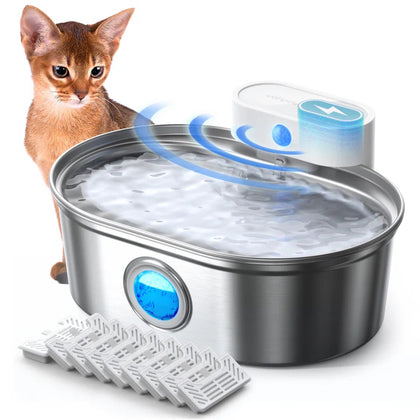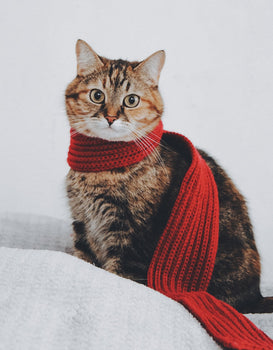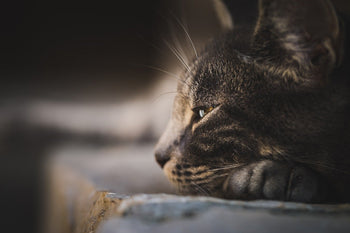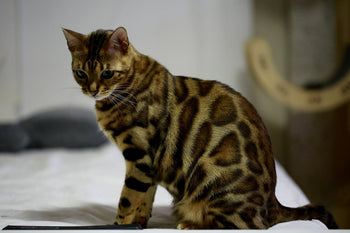Cats are known for their quirky behavior, and one of the most common quirks is their tendency to bite blankets. While this behavior may seem harmless, it can be concerning for cat owners who are unsure of what it means or how to address it. In this article, we will explore why cats bite blankets and what you can do to manage this behavior.
Why Do Cats Bite Blankets?Understanding Cat Behavior To understand why cats bite blankets, it's important to first understand their natural behavior. Cats are predators by nature and have a strong instinct to hunt and play. Biting and scratching are natural behaviors that cats use to play and interact with their environment. Additionally, cats use biting as a way to communicate, whether it's to show affection or to express displeasure.
Health and Stress-Related Issues While biting blankets can be a natural behavior for cats, it can also be a sign of underlying health or stress-related issues. Cats may bite blankets as a way to self-soothe when they are feeling anxious or stressed. Additionally, dental issues or skin irritations can cause cats to bite as a way to relieve discomfort. It's important to rule out any health issues before addressing the biting behavior.
Why Do Cats Bite Blankets: The Reasons Explained

Key Takeaways
Cats may bite blankets as a natural behavior or as a way to self-soothe when feeling anxious or stressed.
Biting behavior can be a sign of underlying health or dental issues.
To manage biting behavior, it's important to address any underlying health issues and provide appropriate outlets for play and interaction.
Understanding Cat Behavior
Instinctual Actions
Cats are known for their hunting instincts. They have a natural urge to hunt prey and catch it. This instinct is deeply ingrained in their behavior, and it can manifest in various ways. One of these ways is biting blankets. Cats may see blankets as prey, and they may bite them as a way to satisfy their hunting instincts.
Comfort and Security
Cats are also known for their love of comfort and security. They like to curl up in cozy places and feel safe. Blankets provide warmth and comfort, and they can make cats feel secure. Biting blankets may be a way for cats to show affection and claim ownership over their favorite cozy spot.
Teething in Kittens
Kittens go through a teething phase, just like human babies. During this phase, they may feel discomfort in their gums, and they may bite and chew on things to relieve the discomfort. Blankets may be a convenient target for kittens to chew on, especially if they are soft and easy to grab.
In conclusion, cats may bite blankets for various reasons, including their hunting instincts, love of comfort and security, and teething in kittens. It's important to understand these behaviors and provide appropriate outlets for cats to express them. Providing toys and scratching posts can help redirect a cat's biting behavior away from blankets and onto more appropriate targets.
Health and Stress-Related Issues
Pica in Cats
One of the reasons why cats may bite blankets is due to a condition called pica. Pica is a condition where a cat craves and eats non-food items, such as fabric, plastic, or paper. This behavior can be caused by several factors, including nutritional deficiencies, boredom, anxiety, or stress. If a cat is biting blankets excessively, it may be a sign of pica, and it is recommended to consult with a veterinarian.
Stress Indicators
Another reason why cats may bite blankets is due to stress. Cats can experience stress due to changes in their environment, such as moving to a new home or the introduction of a new pet. Stress can also be caused by a lack of stimulation or attention. Cats that are stressed may exhibit other behaviors, such as excessive grooming, hiding, or aggression. If a cat is biting blankets and displaying other stress indicators, it is important to address the underlying cause of the stress.
Dental Health
Cats may also bite blankets if they have dental health issues. Dental problems, such as gum disease or tooth decay, can cause discomfort and pain in cats. Biting blankets may provide temporary relief for cats experiencing dental pain. If a cat is biting blankets and exhibiting other signs of dental health issues, such as drooling or bad breath, it is important to consult with a veterinarian for proper diagnosis and treatment.
In summary, cats may bite blankets due to various health and stress-related issues, including pica, stress, and dental health. It is important to address the underlying cause of the behavior to ensure the well-being of the cat.
How to Manage and Redirect Biting Behavior
Providing Alternatives
One way to manage and redirect a cat's biting behavior is to provide them with alternative items to chew on. This can include toys specifically designed for cats, such as chew sticks or dental chews. It is important to ensure that these items are safe for your cat to chew on and do not pose a choking hazard. Additionally, offering your cat a variety of textures and materials to chew on can help satisfy their urge to bite.
Behavioral Training
Behavioral training can also be effective in managing a cat's biting behavior. One technique is to use positive reinforcement to encourage your cat to engage in alternative behaviors, such as playing with toys or scratching on a designated scratching post. It is important to avoid punishing your cat for biting, as this can lead to further aggression.
Environmental Enrichment
Providing your cat with a stimulating environment can also help manage biting behavior. This can include providing your cat with plenty of toys and playtime, as well as creating vertical spaces for them to climb and explore. Additionally, providing your cat with access to outdoor spaces, such as a screened-in porch or a catio, can provide them with additional stimulation and help reduce biting behavior.
By providing alternatives, implementing behavioral training, and offering environmental enrichment, cat owners can effectively manage and redirect their cat's biting behavior.
Frequently Asked Questions
What does it mean when a cat aggressively bites a blanket?
Cats may bite blankets aggressively for a variety of reasons. It could be a sign of playfulness or a way for them to release their energy. Additionally, some cats may bite blankets as a way to assert their dominance or to show affection. However, if the behavior is accompanied by growling or other aggressive behavior, it could be a sign of stress or anxiety.
Is there a reason my cat kneads and bites the blanket simultaneously?
Kneading and biting the blanket at the same time is a common behavior in cats. It is believed to be a remnant of their kittenhood when they kneaded their mother's belly to stimulate milk flow. The biting behavior could be a way for the cat to mark their territory or a sign of affection.
Can a cat's blanket biting behavior be linked to their purring?
Purring is a sign of contentment in cats and is often associated with positive behaviors such as kneading and snuggling. However, purring alone is not necessarily an indicator of blanket biting behavior. Other factors such as the cat's age, breed, and personality may also play a role in this behavior.
Why might a neutered male cat exhibit biting and kneading behavior with blankets?
Neutered male cats may exhibit blanket-biting behavior due to a variety of reasons. It could be a sign of boredom or anxiety, or it could be a way for the cat to mark their territory. Additionally, some cats may exhibit this behavior as a result of past traumas or negative experiences.
What causes cats to bite and shake blankets?
Biting and shaking blankets is a common behavior in cats and is often associated with playfulness. It could also be a way for the cat to release their energy or to practice their hunting skills. However, if the behavior is accompanied by growling or other aggressive behavior, it could be a sign of stress or anxiety.
How does the time of day affect a cat's tendency to bite blankets?
The time of day does not necessarily affect a cat's tendency to bite blankets. However, cats are naturally more active during the night and may exhibit more playful or energetic behavior during this time. Additionally, some cats may have specific routines or habits that involve biting or kneading blankets at certain times of the day.

















